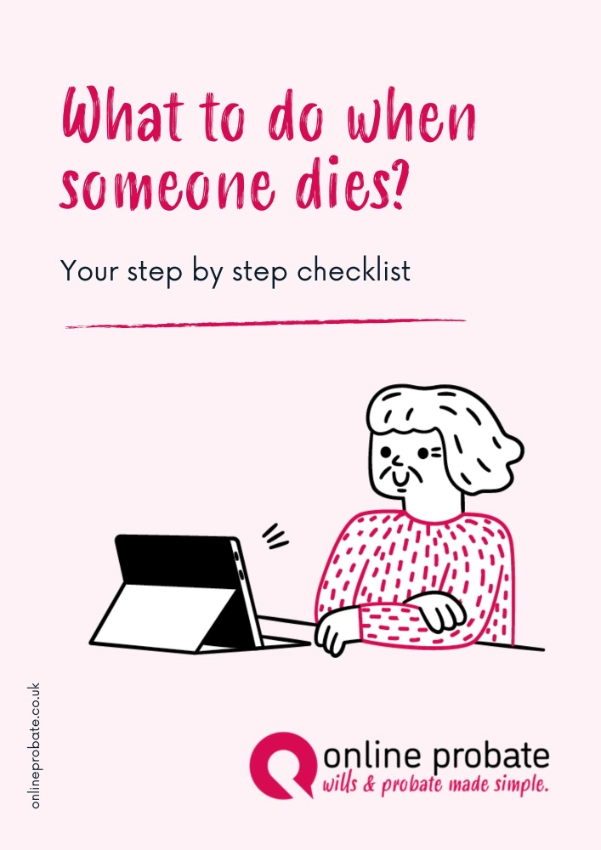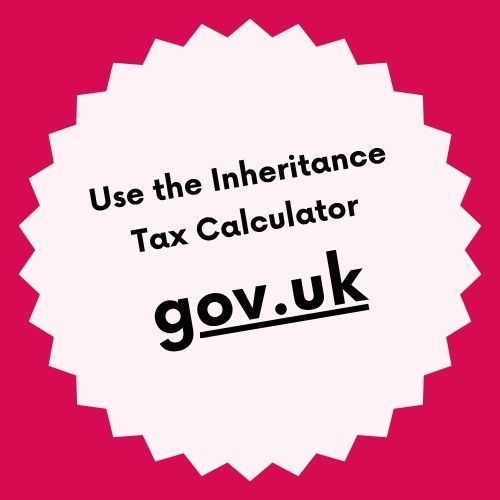The emotional impact of losing someone can be overwhelming, and knowing what to do when someone dies isn’t always easy. Navigating your way through the process of dealing with death can be a complex journey, but we’re here to help. This guide has been designed as your personal checklist. You’ll find a step-by-step practical guide to dealing with all aspects of your journey. From registering the death to estate administration. Along with support information, you’ll find all the essential actions to take in the hours, days, and weeks that follow, so you can move forward with clarity and confidence.
Useful Numbers: Bereavement Support
Cruse Bereavement Support
UK’s leading charity
Helpline: 0808 808 1677
www.cruse.org.uk
The Good Grief Trust
Central hub for UK bereavement
www.thegoodgrieftrust.org
Samaritans (24/7 support)
For anyone struggling to cope
116 123 (free)
www.samaritans.org
GriefChat
Access free bereavement counsellors
www.griefchat.co.uk
First Steps
What to do Immediately After Someone Dies
1. Doctors Confirmation
If the death happened at home and was expected, you should call the person’s GP or the out-of-hours service. A doctor will come to confirm the death and issue a Medical Certificate of Cause of Death. A medical professional will provide official confirmation and time of death. You can then arrange for a funeral director to collect the body where it will be taken to a funeral home or chapel of rest.
If it happened in hospital, a care home or hospice, staff will usually take care of this for you.
If the death was unexpected or sudden, you must call 999. The police and ambulance services will attend, and the death may be referred to a coroner.
2. Notify Family and Friends
You may want inform the people who were closest to them. Make sure children, parents and closest friends are made aware. You can support each other. You may want to ask someone to help you make calls. Let people know gently and at your own pace. Don’t feel you need to tell everyone right away.
3. Contact the Funeral Director
If you’re ready, you can contact a funeral director to bring your loved one into their care. If the person had a prepaid funeral plan, their wishes and preferred funeral director may already be recorded.
If there were no funeral wishes or plan in place you may want to shop around. We’ve provided some additional information about finding the right Funeral Director in our guide to planning your own funeral.
4. Look After Immediate Needs
Depending on the situation you’ll need to make sure the person’s property is safe. If they lived alone, check pets, food in the fridge, post and anything urgent that needs attention.
Download The Full Guide
Want to read this guide in your own time? Download the complete guide which includes a personal check-list of tasks.
You’ll find step-by-step practical guidance to dealing with all aspects of your journey. Alternatively, if you need any help or advice, please call us on 0800 920 2939.
What to do When Someone Dies Within the First Few Days
1. Find the Paperwork
In order to register the death and deal with the estate, you’ll need to obtain some important documents and paperwork. This can be done while you’re waiting for the official Death Certificate. here’s what you’ll need:
- Funeral wishes
- Organ/body donation paperwork (contact NHS Organ Donor Register if you’re unsure 0845 606 0400)
- The Will
- Birth, marriage or civil partnership certificates
- Any Deed Poll document if name has been changed
- Documents relating to state pension or benefits
- Proof of National Insurance (NI) Number
- Pension certificates
- Life insurance policies
- Bank and building society accounts.
Essential documents for registering the death
- NHS Card/ Medical Card
- Birth Certificate
- Drivers Licence
- Countil Tax Bill
- Marriage or Civil Partnership Certificate
- National Insurance Number (NI)
- NI number of surviving spouse
- Passport
- Proof of address (utility bill)
2. Register The Death Within 5 Days
You’ll be notified by the doctor or coroner to arrange collection of the Medical Certificate of Cause of Death (also known as a MCCD). At this point you can make an appointment with the Registrar (in the same county where the person died) to officially register the death. Local Register Office: www.gov.uk/register-offices.
You’ll have 5 days from the day that the registrar receives the medical certificate to register the death. It’s a legal requirement to register the death within 5 days. However, if there is a delay due to a coroner’s investigation, the registrar may be able to extend this for you.
Once the death has been registered, the Registrar will give you an A4 folder with important documents and helpful information. Here’s what you’ll find.
a) The Death Certificate
This is a certified copy of the original death certificate which you will need to organise probate and close accounts for the deceased. It is important to ask for several copies which cost £12.50 each in England. It is cheaper to get them now than request them later.
b) Certificate of Burial or Cremation
Otherwise known as the ‘green form’, this will be passed to the funeral director or the person making the arrangements for the funeral. This is an essential item and gives the funeral director the authority to proceed. There is no cost to obtaining this certificate and you should only need a single copy. In cases where the coroner is involved, you may receive an order for burial (Form101). Both has the same purpose.
c) Certificate for Department of Work & Pensions benefits (BD8 Form Registration)
If the person who died was receiving benefits from the Department of Work & Pensions you’ll be issued with this certificate when registering the death. You’ll need to send this to the Department of Work & Pensions (DWP). Details of the death may need to be completed along with details of the person who will be dealing with the estate.
3. Making Funeral Arrangements
If you’ve found a Will, a Letter of Wishes, or funeral plan, you might have a good idea about what your loved one wanted for their funeral. Taking the decision making out of your hands can be a relief, but if the funeral hasn’t been paid for up-front through a funeral plan, you may also be wondering how you’re going to pay for it.
Remember that funeral wishes outlined in a will are not legally binding. They don’t have to be followed if they’re not reasonable.
We understand that managing finances during a time of loss can feel overwhelming. To help ease this burden, many banks will release funds from your loved one’s account to cover funeral expenses. With the appropriate documentation, such as an invoice and a death certificate, the payment can be made directly to the funeral director, so you can focus on what truly matters.
Can’t pay? Check if you’re eligible for a Funeral Expenses Payment.
Tips for Finding a Funeral Director
Location
Consider the location of the funeral home. Think about the practicalities; distance form your home, location of burial or where the ceremony will be held.
Services Offered
Check they offer what you want. Not all Funeral Directors offer natural burials, eco-friendly services, live streaming or direct cremations.
Personal Approach
Visit funeral homes to get a sense of their approach. Ensure the are listening to requirement and tailor their service.
Reputation
What do others say about them. Remember to check Google review, Trust Pilot or their own website.
Once you’ve found a funeral director you’ll need to give them the “Green Form”. Handing this over means you are personally entering into a contract for payment with the Funeral Director.
Here are the key things your funeral director will discuss with you at the time of making arrangements:
Instructions: Did the deceased leave any specific instructions or wishes?
Payment Method: Will the funeral be paid from the estate, funeral plan or by family?
Funeral Type: Determine whether the deceased will be buried or cremated.
Service Type: Traditional, memorial, and location.
Casket or Coffin: Select a casket or coffin.
Obituary: Write an obituary to notify the public about the death and funeral arrangements.
Order of service: Create the order of service, include readings, speakers and music. (If funeral is taking place in a church this can be arranged with the pastor or vicar.)
Pallbearers: Choose Pallbearer to carry the coffin.
Transport: Arrange transport for the family and guests
Flowers: Select flower and arrange for their placement
Music: choose the music to be played during the service
Cemetery/Crematorium: Select a crematorium or direct cremation.
Notification: Notify friends and family
Wake: Decide on a location for a wake. Some Funeral Directors offer rooms to use. Other wise you can hire a private venue or function room
Food: Organise catering if required.
4. Letting Everyone Know
Letting everyone know can be a hard undertaking. Split the job by asking friends and family to help.
Top tip: Make a list of people by categories; friends, family, colleagues, clubs. You could appoint someone from each category to share the news. Refer to address books and banks cards.
Use the Government’s Tell Us Once Service to notify all government organisations listed below. You’ll need to prove their surname, date they died, name and address of the executor or administrator, details of surviving spouse and where they died.
- DVLA
- Passport Office
- HMRC
- Department for Work & Pensions
- The Local council
- Veterans UK
- Social Security Scotland
- Armed Forces Pension
- NHS Pension
- Pension Protection Fund
- Local Gov Pension Scheme
5. Managing The Estate
To build a picture of the estate you’ll need paperwork and details of all bank accounts, home ownership, pensions and life insurance policies. If you had Power of Attorney or helped to manage the deceased finances then you should have a clear idea of what’s what. If you didn’t, you’ll need to gather information by collecting all relevant details and documents to:
Determine the Value of the Estate
This includes listing and valuing all possessions and assets, including joint assets and gifts made in the last seven years.
Determine Inheritance Tax
Calculate whether inheritance tax due (IHT) is payable.
To value an estate, start by listing and valuing all the person’s assets at date of death, this includes property, savings, investments, personal belongings, and any money owed to them. Once all assets have been identified and valued, deduct any liabilities such as mortgages, loans, overdrafts, credit cards, and outstanding bills. The final figure, assets minus liabilities, is the net value of the estate, which is used for probate and inheritance tax purposes.
Calculating Inheritance Tax
6. Work Out If You Need Probate
Probate grants you the legal right, as an executor of a will, to administer the deceased’s estate.
If there was no will or no valid executors then Letters of Administration have to be applied for instead.
Typically, probate is required if the person who died owned assets in their sole name that exceed between £5000-£50,000. Lets take a look at some situations below.
When is Probate Required?
Property Ownership: If the deceased had sole ownership of property, you’ll typically need probate or letter of administration to legally sell it or rent it out.
Significant Assets: Substantial amounts of money in bank accounts, investments or other assets. Check with individual banks because each have their own rules and thresholds.
Will with Trusts: If the will creates Trusts that need to be administered then it’s likely that probate will be required.
No Will (intestate): If there wasn’t a will (also known as dying intestate), then Letters of Administration will need applying for if the estate includes property in the deceased’s sole name, significant savings or investments, or other valuable assets.
Probate Checker
At Online Probate we’ve created a really easy way of checking whether you’re likely to need probate. Use our Online Probate Checker to get instant results in under 1 minute. Get Started here >>
Get Specialist Probate Support
Whether you wish to apply for probate yourself (check out our guide to surviving probate by probate solicitors) or need support to handle the estate, our legal experts are here to help with probate. We’ll support you every step of the way. We have a range of flexible options; all designed to empower you. Choose from:
Grant Only Probate
We’ll apply for the grant of probate for you. We’ll take care of the all the legal heavy lifting, giving you much-needed breathing space to manage the rest of the estate.
Full Administration
We’ll take care of the complete process of managing the deceased’s estate; from applying for probate to distributing assets to beneficiaries. It includes identifying assets and valuing the estate, paying debts and taxes and distributing the remaining assets according to the will or rules of intestacy.
We’re a little different from normal probate solicitors. We offer a simple, affordable and compassionate probate service. Take a look at why families choose us.
We’re real people who care: We’re a local, friendly team and we treat every family like our own. You’ll never be passed from department to department.
Straightforward and Affordable: No jargon. No pressure. No hidden fees. Just clear guidance and fair prices that make sense when you’re grieving.
We’ll Come To You: For the personal touch, we can visit you at your home. We’ll sit down together, explain everything clearly, and take care of the paperwork for you.
7. Distribute Assets
You can start distributing sole assets (owned only by the deceased) once probate or letters of administration have been obtained (if required). You will need to distribute the estate in accordance to the Will (if present) or intestacy laws.
Before you do anything, you’ll need to pay any debts. These include:
- Secured debts; loans on properties or cars.
- Funeral expenses
- Expenses incurred as part of administering the estate (Testamentary expenses)
- Unsecured debts: settling utility bills, credit cards or banks loans; any overpayments made from the DWP, or private pensions.
Download The Full Guide
Want to read this guide in your own time? Download the complete guide which includes a personal check-list of tasks.
You’ll find step-by-step practical guidance to dealing with all aspects of your journey. Alternatively, if you need any help or advice, please call us on 0800 920 2939.
Here If You Need Help
Losing someone is never easy, and sorting everything out can feel overwhelming. But you don’t have to do it all alone. At Online Wills and Probate, we’re here to offer clear guidance, honest support, and a genuinely caring service. Whether you just need a bit of advice or someone to handle everything for you.
To help you stay on track, we’ve created a free, printable bereavement checklist. It walks you through each step with practical, legal, and personal guidance. You can download it below by entering your details, and we’ll also be here to check in and offer helpful tips along the way.
You’re not alone. We’re here if you need us.





